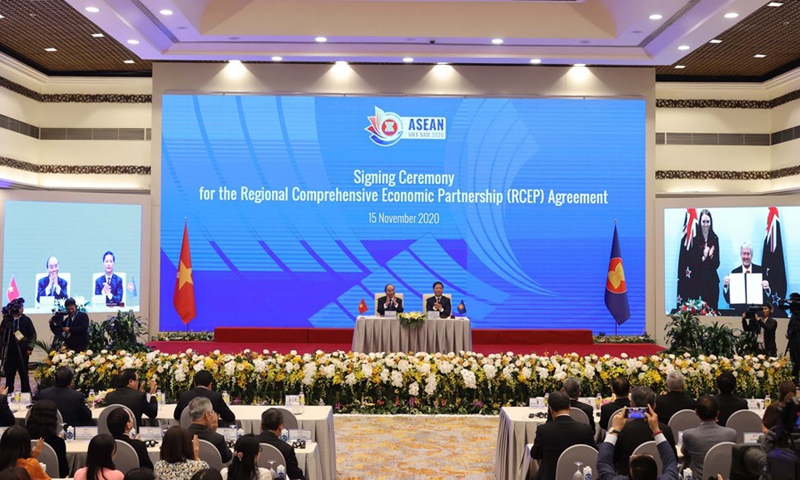US’ crackdown on Chinese transshipment via Vietnam has no practical significance: analyst
By GT staff reporters Source: Global Times Published: 2020/11/23 20:13:40

The signing ceremony of the Regional Comprehensive Economic Partnership (RCEP) agreement is held via video conference in Hanoi, capital of Vietnam, November 15, 2020. Photo: Xinhua
Moves by the US to increase pressure on Vietnam, an emerging Southeast Asian manufacturing hub, over its transshipment role for Chinese-made goods, have no practical significance, and if this practice is halted, all parties will lose, analysts told the Global Times.
US National Security Adviser Robert O'Brien said in a recent Bloomberg interview that he had told Vietnamese leaders that they must curb "illegal re-routing" of Chinese exports and also purchase more US goods such as liquefied natural gas and military equipment to avoid American tariffs.
Further, the aide to US President Donald Trump said the US' trade deficit with Vietnam must be reduced, according to the Bloomberg report.
"The US has no excuse to put the blame only on China for the re-routing," said Sun Xiaoying, a research fellow at the Guangxi Academy of Social Sciences.
Overseas markets like the US and Europe have vast demand for Chinese-made commodities that feature high performance and low prices, and Vietnam has always attached importance to the Chinese transshipment business, Sun told the Global Times on Monday.
"The US threat to Vietnam is more of a geopolitical gesture instead of a practical action. If re-routing is halted, it will mean a loss for multiple parties," Sun noted.
Huang Peng, chairman of Shenzhen-based M&S International Forwarding, told the Global Times on Monday that exports redirected via Vietnam only account for a very small portion of the total, and most of the transshipments will head for the US.
"Vietnamese ports and logistics can't accommodate a large volume of goods," Huang said.
Chinese and foreign manufacturers that have transferred some production to Vietnam from China to reduce costs told the Global Times earlier that the infrastructure in Vietnam is not able to meet their demand, and local workers need more training because of their lack of experience compared with the Chinese labor force.
Last year, Vietnam's customs department said that it would crack down on goods of Chinese origin illegally relabeled "Made in Vietnam" by exporters seeking to avoid Trump's tariffs on Chinese imports.
Vietnam, which has been seen as one of the largest beneficiaries of the years-long China-US trade war, has been struggling to find a path of internal growth.
The Southeast Asian manufacturing hub relies heavily on China for imports of materials and equipments for its labor-intensive manufacturing. Meanwhile, the US is its largest export market.
Bilateral trade between the US and Vietnam increased by nearly 32 percent in 2019, and the US trade deficit with Vietnam rose to nearly $56 billion, an increase of 42 percent over 2018, official data showed. Vietnam has been seeking to import more US goods to help narrow the trade gap following the US' tariff threats.
The US announced the imposition of a preliminary anti-subsidy tariff on car and truck tires from Vietnam earlier this month, citing Vietnam's "undervalued currency".